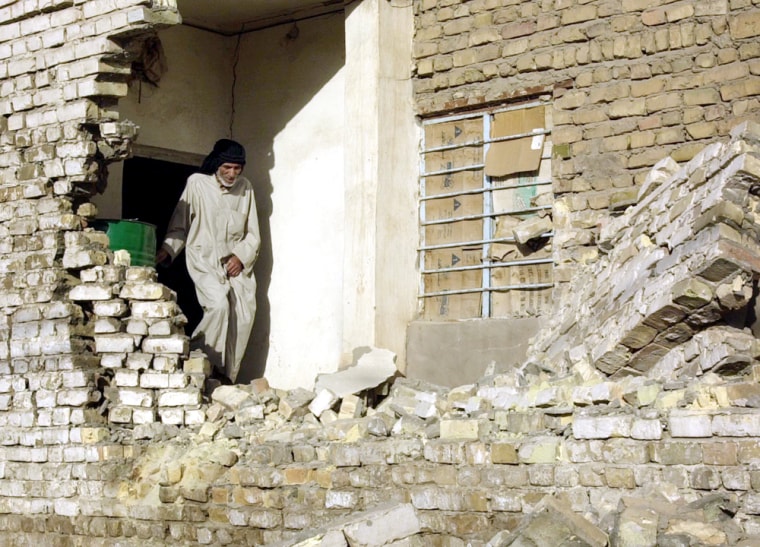Iraqi authorities are holding talks with tribal leaders in the western Anbar province and Baghdad’s tense Sadr City in hopes that militias will hand over their weapons in exchange for a U.S. troop pullback, Iraq’s vice president told the Associated Press.
Ibrahim al-Jaafari’s comments mark the first time that the government has offered detail on the talks first revealed by interim Prime Minister Ayad Allawi. The talks are significant in part because they show the government insistence to try pacify hotspots by peaceful means rather than using military might.
“Dialogue is going on with Arab tribesmen in all parts of the country and the latest visit by some of the brothers took place yesterday here in this house,” al-Jaafari said. “I told them it is necessary that militias be disarmed and that (this action) would be followed by a multinational forces withdrawal.”
Saddam trial ‘might take time’
In a wide ranging interview in his heavily secured Baghdad villa, al-Jaafari also downplayed that possibility that a trial of former Iraqi President Saddam Hussein might start soon because “the huge number of crimes that Saddam Hussein committed might take time to shed the light on them.”
He also said Iraqi authorities had arrested an undisclosed number of foreign fighters — but did not say when or where they had been seized. He said they were caught in Iraq and are being interrogated but “until now it has not been officially proven that they came for sabotage.” He refused to give their nationalities.
The talks have included leaders from Fallujah and Ramadi, bastions for Sunni insurgents known for their anti-American sentiments. Attacks against foreign troops in Anbar have left dozens dead or wounded since the occupation began in March 2003.
Al-Jaafari’s comments during a 30-minute session in his house in central Baghdad came even as U.S. forces launched attacks on Fallujah and Ramadi that the military said killed 60 militants. Doctors and witnesses said at least 32 people, including women and children, were killed.
The military said it was hunting insurgents belonging to the network of terror mastermind Abu Musab al-Zarqawi, the al-Qaida linked militant who has claimed responsibility for attacks throughout Iraq.
Najaf solution pursued in Sadr City
U.S. troops also have clashed in Baghdad’s Sadr City with fighters loyal to radical Shiite-Muslim cleric Muqtada al-Sadr. Al-Jaafari said talks are going on “to solve the problem in Sadr City in a way that avoids killing civilians.”
Last month, three weeks of fighting between Al-Sadr’s al-Mahdi Army and U.S. and Iraqi troops in the Shiite holy city of Najaf ended with an agreement brokered by Iraq’s top Shiite cleric Grand Ayatollah Ali al-Sistani. Since then Mahdi Army handed over security in the old city to Iraqi police and U.S. troops withdrew from that old part of Najaf.
The Najaf solution would also work in Sadr City, he said.
The United States has accused Syria of allowing anti-U.S. foreign fighters to enter Iraq to take part in a 17-month insurgency aiming to force foreign troops from the country. Syria denies the charges.
Speaking about foreign fighters coming to Iraq, al-Jaafari said “there is improvement for sure and security is always discussed in all meetings that take place with neighboring countries.”
“No doubt that when these countries tighten their grip on the border they will largely reduce violations but they cannot control it 100 percent,” he said referring to the long desert border between Iraq and its neighbors that are thousands of miles long.
